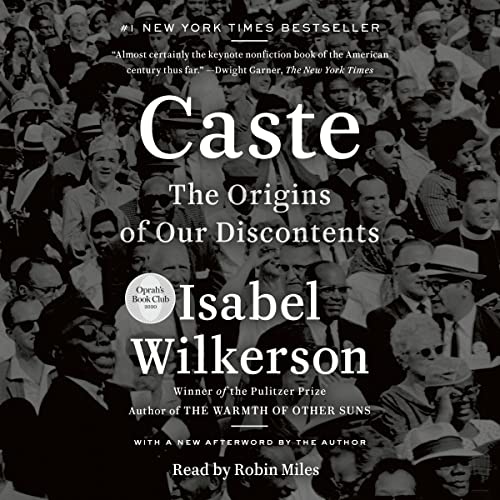“Caste: The Origins of Our Discontents” by Isabel Wilkerson is a groundbreaking work that examines the insidious nature of caste systems and their pervasive influence on societies around the world. Published in 2020, the book has garnered widespread acclaim for its insightful exploration of a crucial yet often overlooked aspect of human social stratification.
Wilkerson, a Pulitzer Prize-winning journalist and author, draws upon her extensive research and personal experiences to shed light on the invisible hierarchies that shape our lives in profound ways. Through a compelling narrative that spans centuries and continents, she argues that caste is a concept distinct from race, class, or other forms of social division, and that its effects are far-reaching and deeply ingrained in the fabric of our societies.
At the heart of Wilkerson’s thesis is the idea that caste systems, though often unacknowledged or denied, have existed throughout human history and across diverse cultures. From the ancient hierarchies of India to the racial caste system that emerged in the United States, these rigid social structures have perpetuated inequality, oppression, and dehumanization on a massive scale.
One of the book’s strengths lies in its interdisciplinary approach, weaving together insights from history, sociology, psychology, and anthropology to paint a comprehensive picture of caste dynamics. Wilkerson draws parallels between the experiences of different marginalized groups, highlighting the commonalities in their struggles against systemic oppression and the resilience they have shown in the face of adversity.

Through vivid storytelling and meticulous research, Wilkerson examines the ways in which caste systems have shaped various aspects of society, from education and employment to housing and healthcare. She illustrates how these systems are perpetuated through subtle and overt means, from the internalization of caste-based beliefs to the enforcement of discriminatory policies and practices.
A significant portion of the book is devoted to exploring the caste system that emerged in the United States, rooted in the enslavement of African Americans and the subsequent institutionalization of racial hierarchies. Wilkerson traces the origins of this system, its evolution over time, and its enduring legacy in contemporary American society. She examines the psychological and emotional toll of caste on both the oppressed and the oppressors, and the ways in which it has shaped the nation’s collective consciousness.
Wilkerson’s writing is both accessible and profound, weaving together personal narratives, historical accounts, and scholarly analysis to create a compelling and thought-provoking work. Her use of vivid metaphors and analogies, such as comparing the caste system to an invisible house or a colossal container, makes complex ideas more tangible and relatable.
Throughout the book, Wilkerson challenges readers to confront their own biases and complicity in perpetuating caste systems, encouraging them to engage in self-reflection and critical thinking. She offers insights into how individuals and communities can challenge and dismantle these oppressive structures, emphasizing the importance of empathy, education, and collective action.
One of the book’s most powerful aspects is its ability to reframe our understanding of societal divisions and inequalities. By positioning caste as a distinct and overarching concept, Wilkerson invites readers to consider the deeper, systemic roots of oppression and to rethink the ways in which we approach issues of social justice and human rights.
“Caste” has been widely praised for its ambitious scope, rigorous research, and thought-provoking insights. It has sparked valuable conversations and debates within academic circles, as well as among the general public, encouraging a deeper examination of the hidden hierarchies that shape our world.
While the book’s central thesis and arguments are compelling, some critics have raised concerns about the potential oversimplification of complex social dynamics or the overgeneralization of certain concepts across vastly different cultural contexts. Others have questioned the extent to which the caste framework can be applied to contemporary societies, given the evolving nature of social stratification and the intersectionality of various forms of oppression.
Despite these critiques, “Caste” remains a significant and influential work that challenges readers to confront uncomfortable truths and to reimagine the foundations of our societies. Wilkerson’s ability to weave together personal narratives, historical analysis, and sociological insights creates a powerful and compelling narrative that resonates with a wide audience.
In a world grappling with persistent inequalities, systemic injustices, and social divides, “Caste” offers a fresh perspective and a call to action. It encourages readers to critically examine the invisible hierarchies that shape our lives and to work towards creating more equitable and just societies, free from the shackles of oppressive caste systems.
Wilkerson’s book is a timely and important contribution to our understanding of the complex dynamics of social stratification and the enduring legacies of caste. It serves as a powerful reminder of the human capacity for resilience and the necessity of confronting the deep-rooted structures that perpetuate injustice and dehumanization.